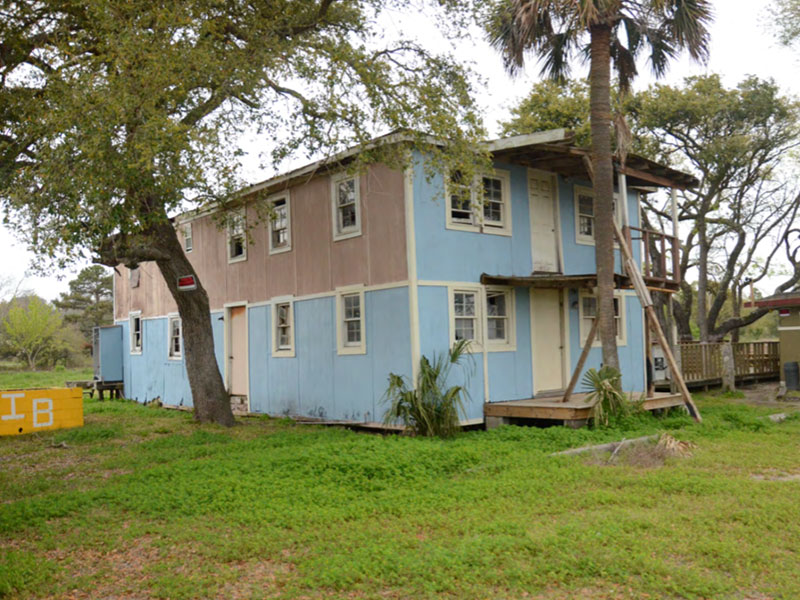Pine Tree Hotel, Mosquito Beach, South Carolina
/Blog/Endangered-African-American-Historic-Sites/Endangered-African-American-Historic-Sites/Pine-Tree-Hotel-Mosquito-Beach-South-Carolina/?link=1&fldKeywords=&fldAuthor=&fldTopic=0
Wednesday, February 19, 2020 • • General
The Pine Tree Hotel was one of the few beach hotels open to African Americans in South Carolina during segregation in the 1960s. Hurricane Hugo in 1989 badly damaged the landmark, and it hasn't been open since.
The 14-room hotel still sits boarded up on James Island in Charleston, but a new $490,000 grant will help pay to restore the historic site near Mosquito Beach, according to the Historic Charleston Foundation.

The rural island community of Mosquito beach off of Sol Legare Road on James Island was a popular waterfront hangout for African-Americans in the early 1950s during the time of segregation. Because blacks were forbidden at white beaches on Folly, the black residents were forced to travel to black beaches such as Riverside Beach, which was all the way in Mount Pleasant. As a resolution, the owners of the Creekside property, which is still owned today by the same family, opened a pavilion in 1953. The community was christened "Mosquito Beach" in an attempt at realistic irony in honor of the pesky insects that populated the marsh. The "Pine Tree Hotel" was constructed in 1961 and had 14 rooms where guests shared a common kitchen and bathroom.
Recently, the owners of Pine Tree Hotel had to defend the structure against aggressive Charleston County Building inspectors who fought for having the building demolished. After making the building safe from trespassers and enclosing it in a chain link fence, Charleston County continued to demand its demolition and the owners had to defend itself in court. Though a the most recent judgement dismissed the county's claims, the hardships put on the owner make it difficult to have the resources to rehabilitate the property.
Links:
Hotel served black beachgoers in Jim Crow South Carolina.
Here's how it could be saved Endangered SC civil rights era hotel on Mosquito Beach to be restored
/Blog/Endangered-African-American-Historic-Sites/Endangered-African-American-Historic-Sites/Historically-Black-beach-to-be-saved-as-Annapolis-parkland/?link=1&fldKeywords=&fldAuthor=&fldTopic=0
Tuesday, February 20, 2024 • • General
Time was running out to save the last vestige of a rollicking African American getaway on the shores of the Chesapeake Bay. The pair of neighboring Jim Crow era resorts once buzzed along the waterfront of the Annapolis Neck peninsula. At their height during the 1950s and '60s, Carr's and Sparrow's beaches attracted crowds by the thousands who came to relax and enjoy some of the top Black entertainers of the day, from Little Richard to Aretha Franklin. But after the venues closed in the 1970s, their once-expansive acreage began to be swallowed by suburban development: a gated subdivision, a marina, a senior-living community and the expansion of a wastewater treatment plant.
/Blog/Endangered-African-American-Historic-Sites/Endangered-African-American-Historic-Sites/Grave-Matters-The-African-American-Cemetery--Graves-Fund/?link=1&fldKeywords=&fldAuthor=&fldTopic=0
Wednesday, February 7, 2024 • • General
Published January 12, 2024 By Joanna Wilson Green, Cemetery Preservation Archaeologist
We are nearly halfway through the 2023-24 African American Cemeteries & Graves Fund grant cycle, and it has been a busy few months! As of publication we have issued 13 maintenance grants and three new extraordinary maintenance grants, all of which add up to a total of $168,931 in grant funding disbursements. Our newest extraordinary maintenance block grant recipients include Union Street Cemeteries in the City of Hampton (brush removal and landscape restoration), Union Baptist Church-Shores in Fluvanna County (ground penetrating radar survey), and Oakland Baptist Church Cemetery in the City of Alexandria (headstone repair and landscape restoration). A list of successful applicants may be found at the end of this article. We enjoy working with our existing grant recipients and look forward to meeting new ones as the year goes by.
/Blog/Endangered-African-American-Historic-Sites/Endangered-African-American-Historic-Sites/Americas-oldest-Black-town-is-threatened-by-floods--and-seeking-a-Plan-B/?link=1&fldKeywords=&fldAuthor=&fldTopic=0
Sunday, January 28, 2024 • • General
January 28, 2024 - On a blustery January afternoon in Princeville, N.C., about 35 citizens met with their mayor, elected commissioners and the U. S. Army Corps of Engineers in their new flood-resistant town hall, built in 2020. Across Main Street, elderly residents were climbing two flights of stairs to enter their senior center, raised 14 feet above ground level in 2021. A quarter-mile away, the Tar River — Princeville's longtime nemesis — rolled on quietly, north to south. The Tar and its latent forces were the reason for this meeting. Princeville, the oldest Black-chartered town in the United States, has suffered through at least nine hurricanes and floods since it was established at the end of the Civil War. They're only getting worse. In 1999, Hurricane Floyd breached the town's levee and left 10 feet of standing water for two weeks, destroying nearly 1,000 buildings. Floyd was followed in 2016 by Matthew, which again breached the levee and demolished half the town.

